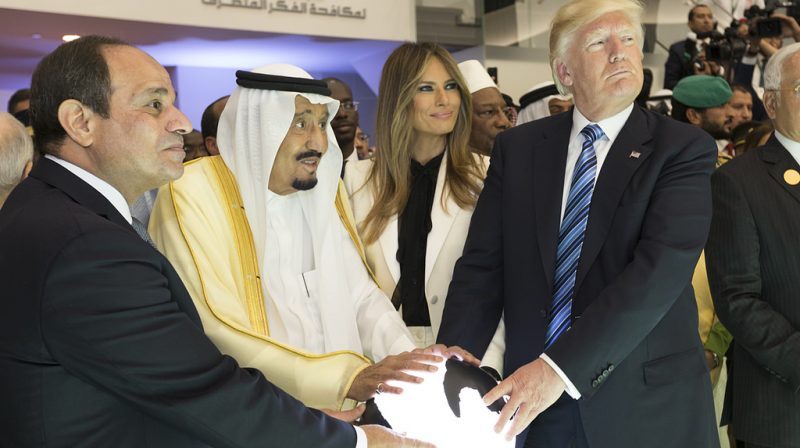After arms dealing in Saudi Arabia, an audience with Pope Francis and haranguing NATO allies over defence spending, Donald Trump faces the first test of his international cooperation on climate change: the G7.
In the medieval streets of Taormina, Sicily, one of which was reportedly widened to accommodate the US president’s motorcade, a tense summit begun on Friday.
At previous meetings, the group of major developed economies has produced strong declarations on climate action. And while Trump is considering pulling out of the Paris climate deal, the other leaders still consider it a priority.
A protracted bone-crusher of a handshake between Trump and France’s newly-elected president Emmanuel Macron at the preceding NATO summit in Brussels set a combative tone. Macron’s national pride is at stake, as host of the historic Paris summit.
The Pope took a softer approach, handing Trump a copy of his 184-page encyclical on caring for the environment. Meanwhile back in the US, 22 Republican senators added their voices to the anti-Paris camp.
With Trump notoriously swayed by the last person he’s talked to, the G6 will be keen to extract some kind of commitment before he heads home. How far can they push for ambition without alienating the self-appointed champion of coal miners? Karl Mathiesen asks.
Shakespearean tragedy
Brazil’s political crisis deepened last week as tapes emerged of president Michel Temer appearing to condone paying hush money to a politician jailed on corruption charges.
Fabiano Maisonnave reports how Temer was betrayed by JBS, meatpacking giant and part of the agricultural lobby he courted at high cost to the rainforest.
Lamu coal
A Kenyan delegation has inked a $2 billion deal with Chinese investors to build a coal power plant next to a world heritage site, despite an ongoing legal challenge.
Campaigners object that the plans will double Kenya’s energy sector emissions and harm Lamu county’s delicate marine ecosystem. They want Unesco to intervene, as it did regarding Bangladesh’s controversial Rampal plant on the edge of the Sundarbans mangroves.
But there are powerful geopolitical winds behind the 1,050MW plant, reports Daniel Wesangula. The deal forms part of China’s “belt and road” overseas investment strategy and enjoys government backing in Kenya.
Forest fiddle
France may be defending the Paris deal internationally, but in the EU it is watering down rules on accounting for forest carbon.
Documents seen by Climate Home show how it is one of the countries successfully lobbying to harvest more trees without recording the climate consequences.
Climate conversation
Former EU climate commissioner Connie Hedegaard says transparency is essential if the aviation climate deal is to genuinely contribute to global carbon-cutting efforts.
The G20 must support good jobs in the transition to a clean economy, write Ivetta Gerasimchuk and Anabella Rosemberg.
That means not just offshoring polluting sectors, a practice researcher Yue Maggie Zhou highlights.
Drought cover
Malawi got “too little, too late” from an insurance scheme supposed to cover early response to drought and crop failure, according to an Action Aid report.
The African Risk Capacity, an initiative backed by the G7 to address risks driven by climate change, only paid out nine months after the government declared a national emergency. Malawians went hungry while the insurer reviewed its assumptions.
Climate ‘censorship’
The Centre for Biological Diversity is suing US federal agencies over what it calls “censorship” of climate change data.
This complaint, based on freedom of information law, is part of a wave of climate-linked litigation. Columbia University’s Sabin Centre identified 654 such cases in the US, more than three times the number across the rest of the world. Experts expect the number of court battles in developing countries to increase.
Small is beautiful
Off-grid renewables are the best value way of bringing power to most of rural Africa, according to a Dutch government report.
Yet in the race to electrify the continent, where more than 600 million people have no electricity, big projects tend to be more attractive to investors.
